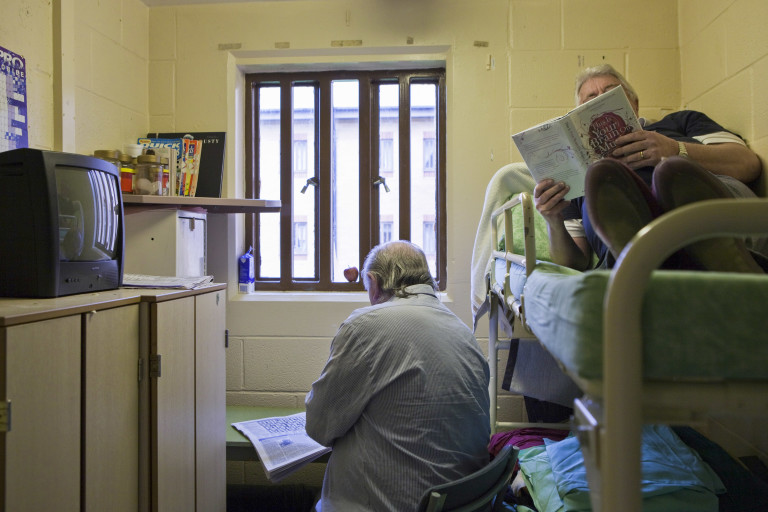2 Mar 2015
Feeding the crime problem: 3 in 4 men’s prisons are overcrowded

The scale of the prison overcrowding crisis in England and Wales is laid bare today (Monday 2 March) as figures reveal that three in four men’s jails are holding more people than they are designed for.
Ministry of Justice (MoJ) data, analysed by the Howard League for Penal Reform, shows how prisons have been forced to cram more people into cells as prisoner numbers have grown and other jails have closed.
Between the end of January 2013 and the end of January 2015, the prison population (excluding immigration removal centres) rose from 83,062 to 83,680. Over the same period 12 prisons were either closed or re-roled and the number of places was cut from 78,935 to 75,374.
Increased overcrowding has coincided with deep staff cuts and a rise in the number of suicides, self-harm incidents and violent attacks behind bars.
The problem is most acute in local and training prisons for men. At the end of last month, 64 of the 75 Category B and Category C men’s prisons in England and Wales had populations larger than their Certified Normal Accommodation (CNA) levels – the prison service’s own measure of how many prisoners can be held safely and decently.
The most overcrowded prison was Leeds. Designed to accommodate 669 prisoners, the Category B jail was in fact holding 1,218 at the end of January 2015.
Other prisons with huge overcrowding problems include:
Swansea (designed to accommodate 242, but holding 422)
Wandsworth (designed to accommodate 943, but holding 1,606)
Leicester (designed to accommodate 214, but holding 361)
Exeter (designed to accommodate 318, but holding 530)
Preston (designed to accommodate 433, but holding 682)
Durham (designed to accommodate 591, but holding 922)
Bedford (designed to accommodate 322, but holding 498)
Doncaster (designed to accommodate 738, but holding 1,120)
Cardiff (designed to accommodate 539, but holding 810)
Further MoJ figures, obtained by the Howard League under the Freedom of Information Act, reveal the extent to which prisoners were ‘doubled-up’ or ‘trebled-up’ in cells to make more room.
‘Doubling’ is the term used by the MoJ to describe holding two people in a cell designed for one. ‘Trebling’ refers to the practice of holding three people in a cell meant for two.
Data for the financial year 2013–14 shows that, on a typical day, almost 19,000 prisoners were doubled-up and about 800 were trebled-up.
Doubling was most common in Wandsworth prison, where almost 1,100 men on average were made to share cells designed for one.
Doubling or trebling was also the norm in many other prisons, including Serco-run Doncaster, G4S-run Birmingham, Nottingham, Preston, G4S-run Altcourse, Sodexo-run Forest Bank, Durham, Manchester, Pentonville and Lincoln.
At its worst, overcrowding can mean two prisoners sharing a 6ft-by-10ft cell designed for one with little ventilation and an unscreened toilet at the foot of the bunks.
Official inspections have found prisoners spending up to 23 hours a day in such conditions, as overcrowded prisons lack the resources to house people safely, give them something to do and reduce reoffending following release.
The figures indicate that plans to set up a network of resettlement prisons – keeping prisoners close to their homes and probation workers in the last three months of their sentence – will founder unless the prison population is reduced.
Current pressures mean that prisoners are placed where there is a bed, not where they need to be to best reduce reoffending.
Frances Crook, Chief Executive of the Howard League for Penal Reform, said: “Caging men in squalor with nothing to do all day is never going to help them become law-abiding citizens on release. Far too many people are being sent into already overcrowded jails and the need to stem the flow is now urgent. Government must get a grip on a prison system in crisis that is feeding the crime problem and creating more victims.”
Notes to editors
- The Howard League for Penal Reform is the oldest penal reform charity in the world. It is a national charity working for less crime, safer communities and fewer people in prison.
- The Ministry of Justice publishes prison population data weekly. The statistics are collated on the ‘Weekly Prison Watch’ page on the Howard League website.
- On ‘doubling’ and ‘trebling’, the Ministry of Justice provided an average overcrowding figure for each prison by totalling the number of prisoners held in ‘doubled’ or ‘trebled’ accommodation at unlock on the last day of each month and dividing by 12.
- Population data for each prison in England and Wales can be found here.
Contact
Rob Preece
Press Officer
Tel: +44 (0)20 7241 7880
Mobile: +44 (0)7714 604955
Email: [email protected]
ISDN line available on 020 7923 4196 – uses a G722 system
For enquiries outside normal office hours, please call +44 (0)7918 681094
-
Join the Howard League
We are the world's oldest prison charity, bringing people together to advocate for change.
Join us and make your voice heard -
Support our work
We safeguard our independence and do not accept any funding from government.
Make a donation